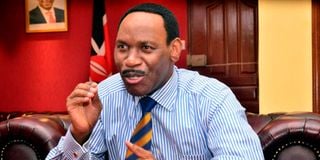
Music Copyright Society of Kenya CEO Ezekiel Mutua (center) with Kenyan artists during royalties’ distribution to artists in the first scientific calculated pay out based on audio-visual play and logs from the various media stations at Safari Park Hotel in Nairobi on January 25, 2024.
Wrangles over leadership at the Music Copyright Society of Kenya (MCSK) have culminated in the postponement of general elections.
At the same time, a faction of artistes is seeking the ouster of MCSK CEO Dr Ezekiel Mutua and chairman Lazarus Muli. Through a court order obtained by a faction of the members of the welfare, MCSK was refrained from holding the elections which were to be conducted on Thursday, August 29.
In the orders by Judge LN Mugambi, the group wanted the elections stopped pending hearing and determination of another matter on the same, which is also in the court. The immediate office, led by embattled CEO Dr Mutua and the chairman Mr Muli, had summoned for the election through gazettement.

Dr Ezekiel Mutua gestures during a past interview.
Sunday Nation has a copy of the text that was circulated to members earlier in the week.
It reads: "Dear members, elections for governing council scheduled for 28/08/2024 have been postponed. A new notice will be issued soon.” At the same time, the caretaker committee, whose names are contained in CR 12, which is a document recognised by the registrar, wants both the chairman and the CEO to pave the way and have the committee run the affairs of musicians until the general elections are conducted.
In a letter dated August 16th, 2024, written by one of the MCSK directors, Ms Pamela Mayeku Binale, the interim committee has also suspended Dr Ezekiel Mutua for 21 days over misconduct pending investigations.
“Following the events that transpired on August 15, 2024, and in light of your conduct as the chief executive officer of the Music Copyright Society of Kenya, MCSK, the board of directors has found it necessary to issue this formal notice to show cause," read the letter.
According to the letter, Dr Mutua sought reinforcement from the police from the area to the MCSK, with the intent of disrupting a lawful meeting of the board. In the event, his actions interfered with an extraordinary meeting (EGM) on that day.
They now say that unlawful confinement, police intervention, and interference with an extraordinary general meeting are possible violations, and they want him to appear before the caretaker committee to answer to the allegations, which will then decide his fate as CEO. But Dr Mutua, when reached for comment over the issue, said that he is just an employee and he is not opposed to any takeover, as long as guidelines are followed properly.
"Those agitating for my removal should know that, like any other employee, I'm covered, and any attempt to unfairly dismiss me will amount to a suit seeking damages. I will not sit pensively and see my rights violated," he said.
The Kenya Copyright Board (KECOBO), the country’s intellectual property regulator, says through its CEO, Mr Joshua Kutuny, that although it does not infiltrate into the internal affairs of collective management organisations (CMOs), it does recommend that members get involved for good management if it is to prosper.

Music Copyright Society of Kenya (MCSK) chairman Lazarus Muli (seated).
The members’ claims that the current chairman, Mr Lazarus Muli has already exceeded his term limit of six years through an unlawful extraordinary meeting held at Maanzoni on April 28th this year that rewarded Mr Muli an extra year in office.
"The meeting was illegal since there was no quorum because other directors had earlier been unfairly ejected by the current office on separate dates. It’s from the minutes of the same meeting that the office summoned for the election," says George Maina. MCSK, which was registered in 1983 as CMO, has over 16,000 members.
The society’s mandate is to collect money from music users before distributing it to its members as dividends quarterly, twice a year, or annually. Before becoming the CEO at the MCSK, Dr Mutua was the CEO at the Kenya Film Classification Board. He is an appointee of the MCSK; he assumed duties as CEO in 2022.
Year in, year out, there have been outcries over royalties distribution, with members saying that funds are misappropriated.












